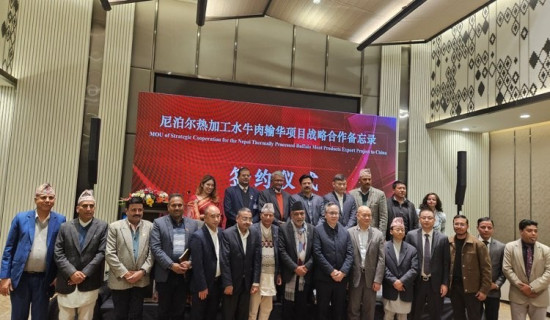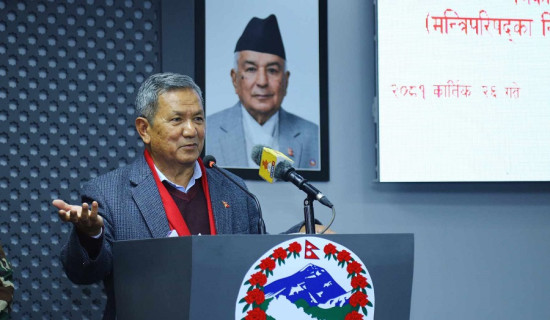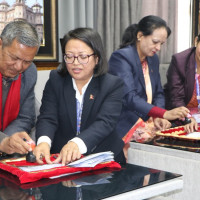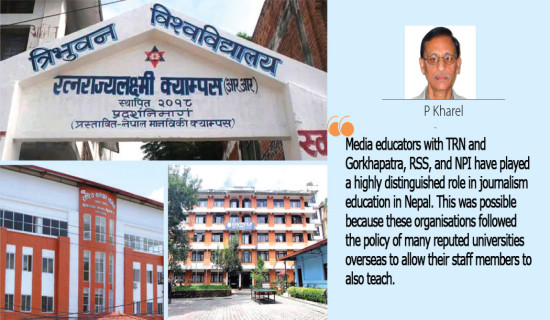- Tuesday, 17 December 2024
Karnali government devising pollinator strategy
By Navin Subedi,Surkhet, Mar. 26: The Karnali Provincial government is set to implement a pollinator strategy. The strategy will incorporate crop protection methods centered on pollination, encompassing bees, cliff bees, mayflies, wasps, and butterflies into its policy.
Bhim Prakash Sharma, Minister of Land Management, Agriculture and Cooperatives of Karnali Province, highlighted that global environmental changes are significantly affecting the agricultural sector. So the provincial government is committed to adopting an environmentally-friendly agricultural policy in response to these challenges, he added.
“We must prioritise the environmental aspect in the formulation of agricultural policies. While we have devised numerous policies in the past, implementation has often been weak. We are now moving forward with a strategy to convey that Karnali is actively taking steps towards meaningful action,” said Minister Sharma. Minister Sharma further said that the new policy will align with the Karnali government's organic province initiative.
Around 70 per cent of the crops cultivated in Karnali rely on pollination. However, Minister Sharma said that there is a significant gap in knowledge and skills related to pollination and pollinators among many farmers.
He also emphasized the need to develop a strategy to address the potential impact on crop production, food security, and overall livelihoods. Various studies have demonstrated that the population of pollinators is declining in Karnali Province as well as globally due to several factors. These include agricultural expansion and intensification, pesticide use, habitat destruction, encroachment, disease outbreaks, and climate change.
Of the 76 crops commonly cultivated in the Karnali, 53 (around 70%) rely on pollinators for production. These crops include several important varieties in terms of both nutrition and economy, such as apples, bitter gourds, beans, and parsley.
A study conducted by the Micro Poll Project in Jumla a few years ago revealed that crop production, income, and nutrition are significantly dependent on pollination.
The study suggested that even though pollinators play an important role in agricultural production, there is a lack of knowledge and management capacity about pollination at different levels, from farmers to policymakers, and it has been suggested that a separate strategy should be designed in this regard.
In Karnali, most of the problems are seen due to food and nutrition security and low income. A study conducted by the United Nations Development Programme has shown that only 23 per cent of the population of Karnali has food and nutrition security.
Bharat Bhandari, Executive Director of the Local Initiative for Biodiversity, Research, and Development (Lee-Bird), said that the abundance and diversity of pollinators in Karnali are crucial for addressing issues of food and nutrition insecurity and for boosting agricultural income. Bhandari highlighted that the collaboration between Lee-Bird and Herd International, supported by the Darwin Initiative and the Sustainable Pollination Management Project in Nepal's agricultural system, with technical assistance from Bristol University, the University of Agriculture and Forestry, and Tribhuvan University, is aiding the provincial government in formulating a strategy.
Despite the significance of pollinators in organic farming, their inclusion in the province and national policies is lacking, leading to challenges in managing essential services such as pollination, Bhandari said. To safeguard pollinators and the invaluable agricultural benefits they offer, it appears imperative to integrate Karnali Province's pollinator strategy across various levels of the agricultural system.
He emphasized that government policies and programmes within the agricultural sector have not adequately prioritized pollination. Therefore, agricultural technicians and educators need to enhance their awareness and capacity concerning pollination management.
The strategy that the provincial government is planning to formulate encompasses programmes aimed at mitigating the impacts of intensive farming systems, regulating pesticide use, safeguarding and managing habitats, promoting crop diversification, raising awareness among farmers, fostering sustainable beekeeping practices, and enhancing the capacity of agricultural trainers, researchers, and disseminators.
















